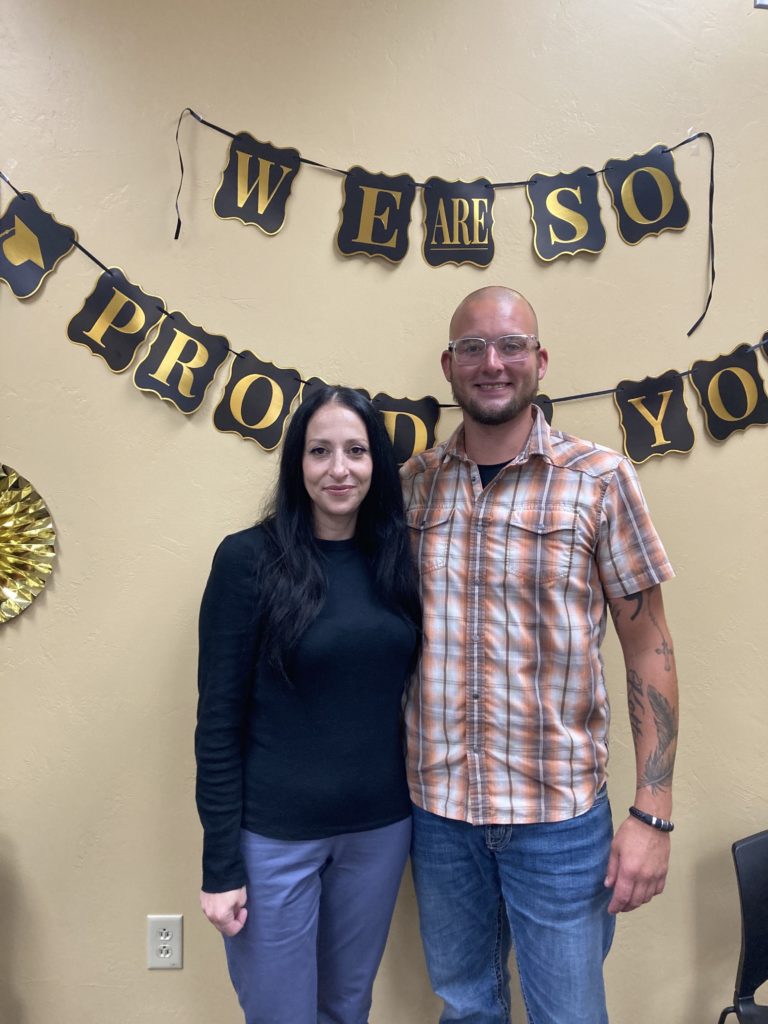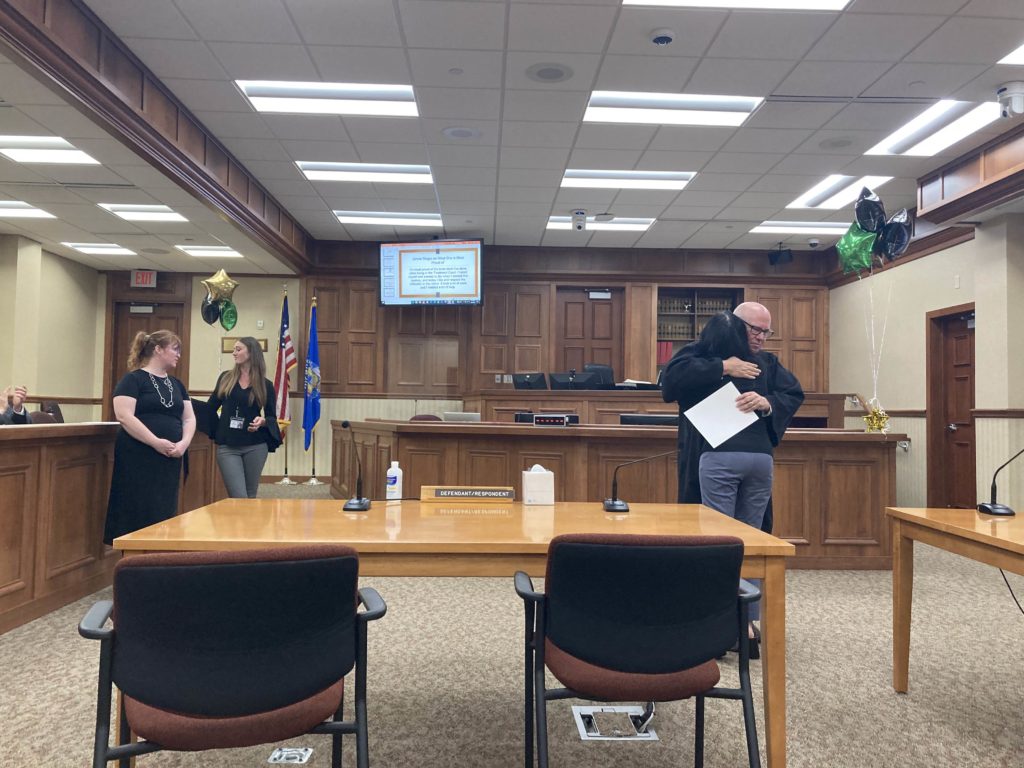Shiny Mylar helium balloons hung next to the judge’s bench, broccoli salad and sodas and cake waited in another room, hugs and speeches were given and a few tears were shed: not exactly what one pictures in a county courtroom. On Aug. 14, Jennifer Singer and Jaylen Wilz became the third and fourth participants to make it through Door County’s fledgling adult drug treatment court program, a treatment-based alternative to incarceration and the standard probation model.
The first treatment court in the U.S. was established in 1989. Now there are more than 4,000 nationwide, including 86 in Wisconsin. Door County launched its program in 2020. It was the result of an effort that took two and a half years, led by Door County Circuit Court Judge David Weber, Sheriff Tammy Sternard, District Attorney Colleen Nordin, public defender Tara Teesch and county Health and Human Services director Joe Krebsbach.
Weber is careful to point out that treatment court is not a diversion program nor a “get-out-of-jail-free card.” Participants must still plead to a felony, he said, and do not get charges dropped as a result of their participation. They can avoid jail time only if they comply with treatment court expectations.
High risk, high need
Those expectations are high. There are five phases of the program and completion can take one and a half to two years. Frequent and random drug screenings, home visits, therapy, probation and case manager appointments, recovery meetings, and classes are some of the requirements of the program.
Weber also is careful to point out who the treatment court program is not for: violent or sexual offenders, or enterprising drug dealers, he said. The people who qualify for the program represent a small subset of the criminal population; they are at high risk for returning to the criminal justice system and have a high need for treatment of their substance use disorder, according to Weber.
Door County’s treatment court received a federal grant to get up and running, and used the funds to hire court services supervisor Kelsey Christensen and receive training from the National Drug Court Institute.
The rest of the treatment court team is composed of representatives from the Department of Corrections, District Attorney’s office and public defender’s office; Health and Human Services treatment personnel; law enforcement; people with resources in the recovery, employment and housing communities; and Judge Weber.
This wraparound approach creates a support network for people who often have no one in their corner, said Christensen.
The carrot and the stick
Treatment court participants are skeptical of a system they have been in and out of many times, Weber said. Jail time, fines, and getting their children taken away are common things participants have experienced.

“They look at the whole system as being part of a machine that is not particularly friendly, and now a judge comes out and asks how they’re doing, how many days they are sober,” Weber said. “We clap.”
Distrust in the court system can be overcome by consistently giving more rewards than sanctions and helping participants find their meaning in lives, Weber said. Many people who make it into his courtroom are lost, he said, and the team tries to identify and develop their individual talents and strengths.
Treatment court stresses honesty and accountability above all else. Participants are not sanctioned for episodes of relapse unless they lie about it. They have to work hard to reframe their thinking, redevelop healthy coping and survival skills, and learn how to find value in themselves, Christensen said.
As both the team leader and the figurehead of the treatment court program, Weber is “the carrot and the stick” for participants, and the success of the program is inherent in the chemistry in the courtroom and the relationship he develops with participants.
Case in point
“It gives me goosebumps that he said that,” Singer said when she heard what Weber said about his approach. She described the way she was treated by the judge when she was in shackles and an orange jumpsuit. “I’ll never forget the tone he used, his voice, how soft it was, how kind,” she said. “It wasn’t fake, you know.”
Weber and the rest of the team had faith in Singer when, she said, she felt disgusting, like an animal. According to Singer, when the world was at its coldest and hardest, Weber’s courtroom was her point of no return to getting the help she needed.
That faith in her helped drive Singer to get sober and graduate the program this summer. Singer also now has her youngest daughter back after her daughter spent a year in foster care.

Growing pains
The county’s drug treatment court program is in its infancy, and like all growing things, much remains to be seen.
At least it’s a chance for some people, according to alcohol and other drug therapist Lisa Barnaby and Donna Altepeter, behavioral health manager at the Health and Human Services department.
Now they have an entire team, they have expectations, and they have a judge saying “I believe in you,” Altepeter said. Treatment court works in a very different way from voluntary services; participants cannot walk away easily, and accountability is high, she added.
The biggest advantage for Door County’s treatment court program is the cohesion amongst the various agencies to make it work. Everyone is on board, according to Barnaby, who provides AOD therapy as part of the court’s services.
There are a lot of barriers faced by participants, however, she said.
A crucial responsibility of the treatment court team is to break those barriers so participants have a real chance in recovery, and a chance to be a productive member of the community. The county’s lack of sober living or affordable housing, inpatient treatment, and enough mental health providers are some of the biggest barriers, she said.
“It is the most challenging part of our job,” Christensen said in an email. Some local employers have stepped up and have been willing to hire participants and provide housing for them, which is a start, she said.
End game
Singer was admitted to the treatment court program after an arrest following one of her darkest moments. She was desperate and hopeless, but now she sees the light in that darkness, she said. It brought her to a place of what she believes is long-term recovery from a drug addiction she has suffered from most of her adult life.
According to Christensen, the drug treatment court team is hopeful it can help more people see the light by moving from punitive to treatment-based initiatives when dealing with substance use disorder in Door County.

